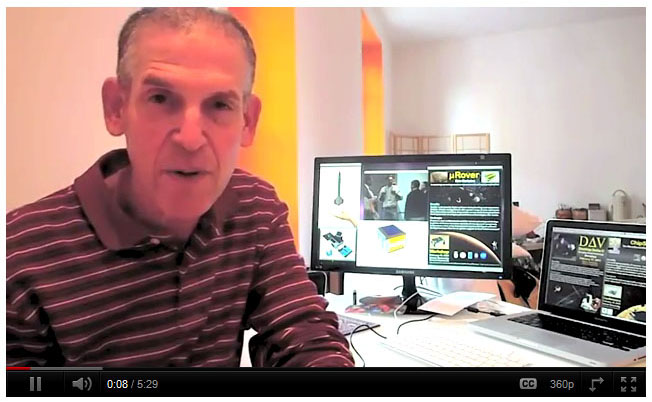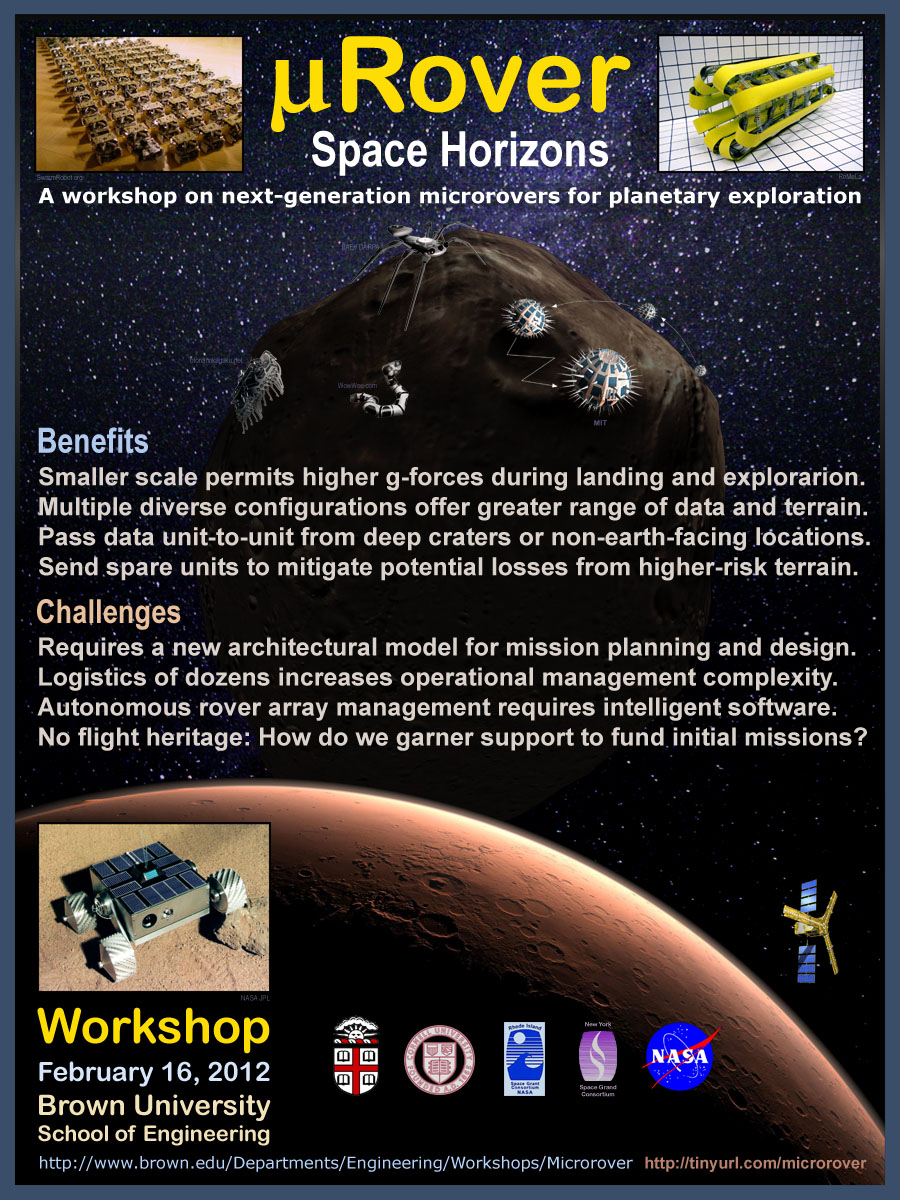Brown University
School of Engineering
Workshop News
Meet and Greet (informal reception)
Wednesday, February 15, 2012, 5:00 to 7:00 p.m.
One-Day Workshop (all sessions are plenary)
Thursday, February 16, 2012, 8:30 a.m. to 4:00 p.m.
Barus and Holley Building Lobby
182 Hope Street
Providence, RI 02912
MicroRover
focused on research and innovation in the
design and utilization of microvehicles for planetary research and
other space applications. We nominally limited discussion to
vehicles no greater than 10 kg in mass, yet our primary goal was the
exploration of over-the-horizon innovation, with mass only one
consideration.
The workshop was hosted in Providence, RI by the Brown University School of Engineering with sponsorship from the NASA Rhode Island Space Grant Consortia and in collaboration with the Sibley School of Mechanical and Aerospace Engineering at Cornell University.
As with previous workshops, we enjoyed spirited interchanges among those developing space flight systems and those developing mission applications.
Note: The Strathclyde University meeting took place even after a serious fire on the Glasgow campus that rendered their engineering building inaccessible.
Workshop ParticipationOur workshops are open to anyone bringing relevant insight and expertise to an active discussion on the topic of microvehicle engineering or related space mission applications.
A critical mass of participation is lost in events involving a large number of attendees. As with our previous workshops, we have set a limit of 50 paid participants plus ten sponsored university students from around the country.
US citizenship is not required to participate in the workshop.
Guiding Parameters
The MicroRover workshop continues our highly effective conference format, specifically:* Limited size permitting effective plenary sessions.
- Key innovators from around the world.
- Single-day intensity.
- Affordable registration.
- Informal, student-focused, participative environment.
We provide meals and refreshments during the day of the meeting to foster interactions between sessions.
FeesOnline registration is required for all workshop participants other than invited students (see Student Invitations below).
Through January 31, 2012, online registration is $195. Beginning February 1, 2012 online registration is $250.
Registration the day of the meeting is also $250.
Goto the Registration Page
Registration fees are non-refundable, though you may change your registration online to designate an alternate participant in your place.
The registration fee covers:
- All workshop sessions.
- The 'Meet and Greet' informal reception.
- Continental breakfast at the workshop.
- Lunch in the Chancellor's Dining Room.
Your workshop name tag will serve as your lunch ticket.
Students
By prearranged invitation, we will wave registration fees for all invited students.
See Student Invitations for how to request an invitation.
Invited students traveling from out of state who are US citizens also qualify for overnight lodging support.
Due to NASA funding restrictions, student lodging support is limited to US citizens, only.
The Problem
Rovers as they have been deployed offer a central role in planetary exploration. The majority have supported multiple instruments and have offered the capability to communicate data directly with Earth stations.
On the other hand, rovers to date have also been limited by funding constraints to one or two vehicles per mission. With so much riding on each landing, 'safe' sites' must be selected and ongoing operations undertaken with extreme care and at the lowest risk possible at every juncture.
Smaller rovers may offer less capability individually. Yet if deployed in larger numbers, they may offer a unique and/or complimentary advantage. For example:
- More than one point of interest may be studied simultaneously.
- Unit costs may be lower due to economies of higher production volumes, .
- Spare rovers may be kept on hand during a mission, permitting higher risk operations.
- One large rover might act as
a "mother ship" to transport
families of microrovers to each site of investigation.
Smaller sizes create hurdles. For example, microrovers would offer less area for solar cells, and alternately tapping into a "mother ship' for battery recharges might add a layer of complexity outweighing the utility of distributed families of microvehicles.
Microrovers are also likely only to communicate locally, and relaying data for radio communication back to Earth would add even more complexity to the system.
To those surveying potential pitfalls in the design and operation of microvehicles, challenges are aplenty.
Our Response
In addition to a focus on potential scaling challenges, the MicroRover workshop will investigate opportunities to exploit the advantages of smaller and lower cost-per-unit solutions.
Likely the constraints imposed by smaller vehicles can not be fully circumvented. Yet with a focus on the special capabilities of microvehicles, developing a class of miniature rovers may be worth the effort.
Rather than engineering in a vacuum, to find the greatest utility we must explore the ways microrovers might be utilized by mission planners in order to asses the potential value in actual operations.
The Audience is the Investigator
There is no audience per se. We are all co-collaborators.
Through formal presentations, presenter Q & A, panels and informal venues, we will all seek to stimulate a wide variety of discussions on topics relevant to the central subject of microrover development and mission applications.
To cast the net widely, the following are examples of topical areas under discussion (by no means comprehensive):
- Who are the players in space qualified microrobotics?
- What new types of missions are enabled by microvehicles?
- Where are the missions? - near earth - inner / outer solar system?
- Program costs versus larger-scale rover systems.
- Special design and fabrication requirements.
- New technologies in need of invention.
- Maximum performance capabilities and limitations.
- Unique maneuvering and navigation capabilities.
- How small is "small?" - Is less then 10 kg a reasonable target?
- "Killer app” missions that might launch a microrover 'industry.'
- When might we see preliminary hardware? - first missions?
Workshop Structure
Morning Presentations...
Morning sessions will cover emerging technologies and mission applications. Prominent contributors to the field will present 20 minute executive summaries of their work with Q&A follow up. Topics will focus on areas such as technical enablers, architectural concepts, operational logistics, development costs, and potential missions.
Lunchtime Poster Session...
Sharpe Refectory Chancellors Dining Room (map)
Participating students will present a lunchtime poster session immediately adjacent to the dining room.
Afternoon Panel Discussions...
Afternoon moderated panel discussions will explore microrover systems and the realities of hardware engineering in the light of mission objectives.
Panel discussions will include
a mix
of system architects, mission planners, technology experts, prospective
sponsors (commercial and government) with a strong emphasis on audience
participation.
The first panel will discuss the practical technical hurdles that must
be
surmounted to enable the design and manufacture of the microrobotics.
The second panel session will brainstorm microrover mission
applications and
converge on the sorts of vehicles that might best support these goals.
See Schedule for details.
"Swag"
Table
A table will be provided for those offering giveaway items representing
your
organization or any program related to space borne robotics.
Please let us know what you have in mind and we'll make sure to leave
space for
you.
PowerPoint Slide Presentation and Archive
Presenters
are asked
to bring Microsoft PowerPoint slides on a thumb drive. Prior to the
start of
the workshop, slide files will be loaded to our presentation
computer.
Presentation slides will be available for download from this
website at
the close of the workshop. A permanent copy of slides will be hosted
here for
future reference.
If presenters have concerns about slide publication - please contact us
prior
to the workshop.
ITAR
Workshop speakers and attendees are reminded that some topics discussed
in the
workshop could be controlled by the International Traffic in Arms
Regulations
(ITAR).
US Nationals, which are US
Citizens and Green Card Holders, are
responsible for ensuring that technical data they disclose to non-US
Nationals
in attendance is not export restricted by the ITAR.
Non-US Nationals are likewise responsible for ensuring that they do not
disclose ITAR export restricted information to other non-US Nationals
in
attendance.
Website
Updates
We will endeavor to maintain this site as accurately as possible. Other
than
actual paid registration, nothing written on this site or in any other
form
(accurately or otherwise) constitutes a contractual agreement.
Previous
Workshops in the Space
Horizons Series
2008 - NLV -- Nanosatellite launch vehicles, Photos
2010 - ChipSat -- Satellite on a chip, Photos
2011 - Desktop Delta V -- Safer propulsion, Photos


